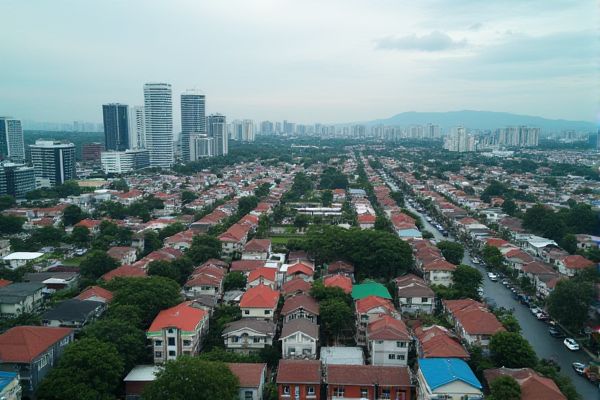
Shopping and retail options in Indonesia: Traditional markets: Pasar. Modern malls: Popular in urban areas. Local brands: Batik, handicrafts. Souvenirs: Unique cultural items. Haggle: Common in markets. Payment: Cash and e-wallets. Imported goods: Limited availability. Operating hours: Vary by region. Consumer rights: Growing awareness. Online shopping: Tokopedia, Bukalapak.
Traditional markets: Pasar
Traditional markets in Indonesia, known as Pasar Pagi, operate from early morning to noon, selling fresh produce such as fruits, vegetables, spices, fish, meat, and other daily essentials. These markets are a hub for daily shopping, social interaction, and cultural experience, with vendors often selling in temporary or permanent stalls, and bargaining being a common practice. Discover more about this vibrant tradition by visiting the Pasar Pagi Wikipedia page, which provides further insights into their significance in Indonesian culture.
Modern malls: Popular in urban areas
Modern malls in Indonesia are predominantly popular in urban areas, featuring sprawling complexes like Grand Indonesia, Pacific Place, and Taman Anggrek Mall. These malls offer a wide range of brands, entertainment options, and convenience through e-commerce integration, catering to the higher incomes and technological savvy of urban consumers. To gain more insights into this dynamic, you can explore the details on the Urban-Rural Divide in Indonesian Shopping Behavior at Kadence's website.
Local brands: Batik, handicrafts
Exploring the vibrant world of Indonesian craftsmanship, one can find a diverse array of handmade treasures that embody rich cultural traditions. For enthusiasts of traditional textiles, Indonesian Hand-Stamped Batik fabrics stand as a testament to the exquisite artistry of local artists, offering a beautiful selection available for purchase by the yard. Complementing this, Dewata Crafts brings forth an extensive catalogue of various Indonesian handicrafts, featuring Bali wood carvings and wooden statues, directly sourced from local artisans at negotiable prices. Meanwhile, From Bali To Us bridges cultures through its curated selection of batik and other artisanal items, passionately supporting independent artists. Each platform not only provides access to these amazing crafts but also fosters a sustainable connection between artisans and global admirers.
Souvenirs: Unique cultural items
Indonesia offers a diverse range of unique cultural souvenirs, including Batik, Wayang Puppets, Woodcarvings, Traditional Masks, and traditional weapons like the Rencong and Keris, each reflecting the rich cultural and artistic heritage of the country. These items can be found in various regions, such as Bali, Java, and Yogyakarta, and are often handmade by local artisans. For those interested in discovering more about these remarkable treasures, visit this detailed exploration of Indonesia Souvenirs on the Authentic Indonesia website to uncover the stories and significance behind each of these artistic creations.
Haggle: Common in markets
Haggling is a norm in Indonesia, particularly in markets, roadside stalls, and shops selling arts and crafts or souvenirs. It involves reaching a mutually satisfying price, starting with a low bid, and being prepared to walk away if the price is not acceptable, while maintaining a respectful and relaxed demeanor. For more detailed guidance, you can explore tips on Roam Indonesia.
Payment: Cash and e-wallets
In Indonesia, popular payment methods include cash, particularly through over-the-counter payments at retail outlets like Indomaret and Alfamart, and e-wallets such as GoPay, DANA, OVO, and ShopeePay, which are widely used due to their ease of use and the high percentage of the unbanked population. E-wallets offer convenient cashless transactions and are regulated by Indonesian government agencies to ensure safety and security. To learn more about the evolving payment landscape and its impact on consumer habits, visit the Xendit Blog, which provides further insights into these financial innovations.
Imported goods: Limited availability
In Indonesia, the availability of imported goods is limited due to new tariffs imposed by the Finance Ministry Regulation No. 96/2023, which includes increased duties on products like perfumes, hair products, iron and steel, bicycles, and wristwatches, aiming to protect domestic industry growth. Additionally, e-commerce firms are required to share detailed data on imported goods, further regulating the import process.
Operating hours: Vary by region
In Indonesia, shopping experiences offer a diverse array of timings and environments, reflective of the country's rich cultural tapestry. Traditional markets, or pasar, usually begin bustling activities as early as 6am or 7am, winding down by mid-afternoon around 3pm or 4pm. In contrast, modern shopping malls extend their welcoming lights from approximately 10am until 10pm, catering to the contemporary needs of urban dwellers. Furthermore, convenience stores enhance accessibility by operating 24/7, though variations can occur during significant religious holidays and observances. For more insights into shopping practices across Indonesia, visit Original Travel for detailed guidance. This flexibility in shopping hours mirrors Indonesia's harmonious blend of tradition and modernity, making it a fascinating destination for both locals and visitors alike.
Consumer rights: Growing awareness
In Indonesia, consumer rights are protected under Law No. 8 of 1999 on Consumer Protection, which includes detailed provisions on consumer and entrepreneur rights, dispute settlement, and sanctions for violations. The government has also implemented a National Strategy on Consumer Protection to enhance consumer education, empowerment, and business compliance, particularly in priority sectors such as E-commerce.
Online shopping: Tokopedia, Bukalapak
Bukalapak is a leading Indonesian e-commerce platform that enables small and medium-sized enterprises (SMEs) and individuals to sell a wide range of products, including electronics, fashion, home goods, and virtual products like e-vouchers and tickets. It offers secure payment options, a user-friendly interface, and a 100% money-back guarantee, making it a trusted online marketplace. With over 50 million users and 5 million sellers, Bukalapak stands out as a significant player in the region. Meanwhile, Tokopedia is another major e-commerce platform in Indonesia, known for its extensive product categories and large user base. It provides a platform for both B2C and B2B transactions, offering products such as beauty and personal care items, consumer electronics, fashion, and more. Tokopedia is recognized as one of the top e-commerce sites in Indonesia, with a significant contribution to the country's Gross Merchandise Value (GMV).
